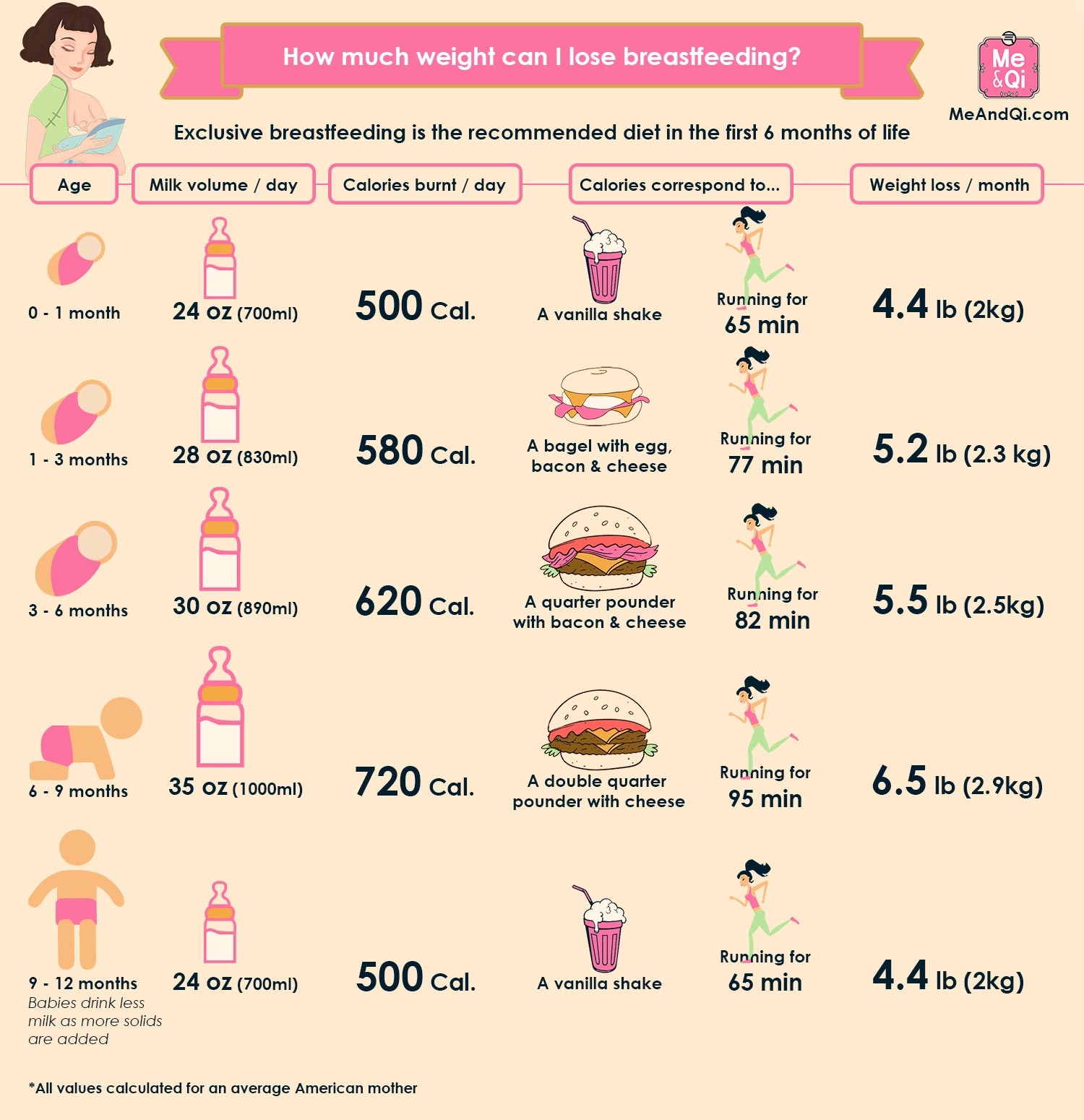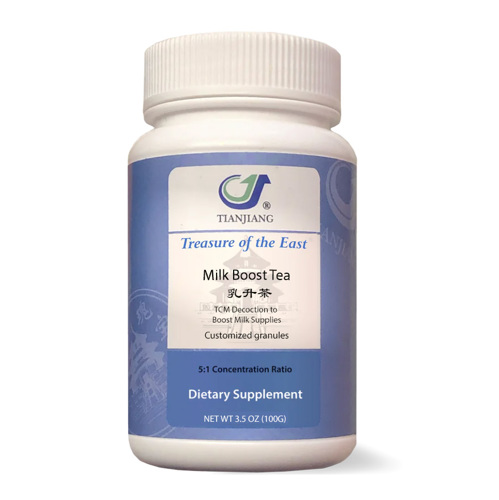If you do things right, breastfeeding can very much help you lose weight. In fact breastfeeding is nature's way of making women lose the pounds they accumulated during pregnancy.
In this article we'll review how much weight you can expect to lose while breastfeeding. We'll also look at potential issues that may prevent you losing weight. Lastly we'll try to understand if there is a difference between pumping and breastfeeding when it comes to losing weight. Click on a topic if you want to directly jump to it. Otherwise read on.
- How much weight can I lose breastfeeding?
- Why am I breastfeeding and not losing weight?
- Does pumping make me lose less calories than breastfeeding?
How much weight can I lose breastfeeding?
We made the infographic below to explain everything at a glance. Read on below the image for more explanation.

Click on the image to make it bigger
How much weight you lose depends, quite logically, on how much milk you express. Assuming you breastfeed exclusively until 6 months old, as is recommended, your milk production should increase from roughly 24 oz (700ml) a day in the first month to about 35 oz (1000ml) past the 6 months threshold. For more details on average milk intake by age, check our baby feeding guide.
Now calories: how many calories are in your breast milk? Most estimates are between 20 and 22 calories per ounce of breastmilk. For our infographic's calculations we've taken an average of the estimates we found, roughly 21 calories per ounce.
This means that in the first month of life the 24 oz (700ml) of milk a day that you produce correspond to about 500 calories. That's the equivalent of a large vanilla milkshake or you running for 65 minutes straight!
Conventional wisdom is that you need to burn 3,500 calories to lose 1 pound. As such if you burn an extra 500 calories a day, you should be able to lose about a pound a week.
All this means that simply by breastfeeding your little one exclusively, and assuming you eat your normal pre-pregnancy diet, you can expect to lose 4.4 - 6.5 lb a month (2-3 kg a month)!
Of course all this is very much theoretical. In fact it is not recommended that you eat your normal pre-pregnancy diet while you breastfeed. The US CDC recommends that nursing women eat an extra 500 calories of healthy food each day to support their milk production. So realistically speaking, if you follow the CDC guidelines you're looking at a loss of up to 2.1 lb a month (1kg).
You could of course lose more than this if you decide to produce more milk and store it for later use. For every extra 5 oz (148ml) of breastmilk produced, that's around 110 calories burnt a day and 1 extra pound lost a month.
If you struggle to produce enough milk, we recommend the excellent Milk Boost Tea. It's a 100% natural herbal tea composed of 13 different herbs. It's a very ancient recipe that we've seen work wonders for many nursing mums.


Why am I breastfeeding and not losing weight?
Many breastfeeding women don't see any weight loss and some even gain weight. There are typically 3 possible reasons for this:
- An unsuitable diet
- Emotional stress
- Low metabolism
Let's look at the details behind all three and how you can resolve the issue.
Breastfeeding and not losing weight due to diet
Many mothers think they need to eat a lot more to help their milk production. While it's true they need to eat more, they shouldn't eat a lot more.
The official CDC guidelines are that breastfeeding women should eat 2,300 to 2,500 kcal per day versus 1,800 to 2,000 kcal per day for moderately active, non-pregnant women who are not breastfeeding. It means that nursing women should eat an extra 500 calories of healthy food each day to support their milk production. That corresponds to a single vanilla milkshake (assuming it was a healthy food, which it very much isn't!).
If you're breastfeeding and not losing weight, look in your diet. Say you're eating 3,000 kcal a day, that's an extra 1,000-1,200 kcal over a normal diet of 1,800 to 2,000 kcal per day. Assuming you produce 24 oz (700ml) of milk a day, if you refer to our infographic above it means you burn an extra 500 kcal with your milk production. This makes you gain weight because you're eating 500-700 kcal (1,000-1,200 kcal minus 500 kcal) more than the calories you consume with your normal activities and your milk production.
If your goal is to lose the extra weight you gained during your pregnancy, we recommend you eat roughly 2,200 kcal a day. That's slightly more than a normal diet but comfortably below the level where you gain more than what you lose by breastfeeding.
We also recommend you produce a bit more milk than what your baby consumes so you can lose some extra calories and have milk stores for later use. It's always useful to have some milk stored away if, for instance, you cannot breastfeed for some reason or another. If you store milk you can also lengthen the period during which your little one drinks your milk. For their health, the longer the drink your milk the better!
To help you produce more milk we recommend Milk Boost Tea. Conveniently enough it only contains herbs so it has 0 calories. The herbs include Licorice, Longan, Yam, King Solomon Seal, Black sesame and Jujube dates which are all believed to stimulate milk production and to help you recover from childbirth.
Breastfeeding and not losing weight due to emotional stress
Taking care of the newborn 24/7, sleepless nights and maybe not receiving enough support from others. All these are dramatic changes to your life can cause a large amount of emotional stress.
For many people, emotional stress is directly linked with weight gain. Your level of cortisol, the "stress hormone", rises dramatically during tension-filled times. This can directly trigger overeating because it helps cause higher insulin levels. That makes your blood sugar drop and you crave sugary, fatty foods.
Besides causing overeating, emotional stress is also often linked with a lower milk supply. This doesn't help your weight loss either: less milk produced, less calories burned.
It's easier said than done but you should find ways to relieve you stress. Getting additional support from close ones for the baby often helps a great deal.
If you're into herbal treatments we recommend Rose flowers, Cinnamon and Flowering quince which are incidentally also ingredients in Milk Boost Tea. You can relieve your stress and increase your milk supply all in one go!

Breastfeeding and not losing weight due to a low metabolism
About 5% of women suffer from postpartum hypothyroidism. Lower level of thyroid hormones slow down your metabolism and you burn less calories as a consequence.
Other typical symptoms of postpartum hypothyroidism include fatigue, constipation, dry skin, a depressed mood and difficulty exercising. Usually this issue arises between month 4 and 8 after birth. If you believe you might be affected, you need to see a doctor so they can help you get your thyroid hormones monitored (eg: TSL, T3 and T4).
Interestingly, it seems to be the case that breastfeeding actively can help reset your metabolism. This scientific study concludes that "lactation plays an important role in 'resetting' maternal metabolism after pregnancy". So if you believe you suffer from a low metabolism, the solution might very well be to breastfeed or pump more!
Does pumping make me lose less calories than breastfeeding?
Not only pumping doesn't make you lose less calories than breastfeeding, it might help you lose more.
The number of calories that you lose is all about the quantity of milk you express, no matter if you breastfeed or pump. The big difference is that while there is a limit to the amount of milk you can breastfeed (you baby's stomach capabilities!), there is no limit to the amount of milk you can pump out.
What many mums do is breastfeed their little one and pump on top so they can make reserves for the future, especially during the first 6 months. The first 6 months are key because you can easily increase your milk supply during that period, there is a lot of flexibility for this. It becomes much harder after 6 months, at that stage a realistic objective is rather to keep your supply constant.
If you have issues producing enough milk, we recommend Milk Boost Tea, a 100% natural herbal tea that works wonders to stimulate milk production. It contains 13 different herbs which all play a role in helping you produce a quality milk supply.

